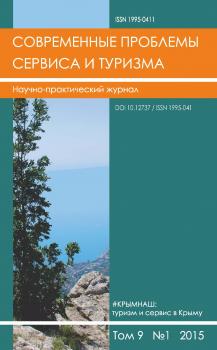from 03.06.2013 to 01.03.2017
Difficulties states faced in the implementing the sustainable development concept, the new challenges caused by financial and economic crisis of 2008-2009 which are considered by most experts as the systemic one, require serious modernization of the sustainable socio-economic development strategies on all management levels. Search for the ways of the strategies adjustment and new mechanisms of their implementation has resulted in the fundamental change of the economic model, the transition from “brown” to “green” economy based on the principles of economic security, the resources efficiency and social justic International organizations such as the United Nations Organization (UN), the World Bank, the International Monetary Fund (IMF), the UN Environmental Program (UNEP), the World Tourism Organization (UNWTO) consider tourism to be one of the ten key sectors of the global economy which green innovative modernization is able to ensure the transition to the new economic model and “green” economic growth. The analysis of the results of the international and national structures’ activity aimed at the greening of the global economy and tourism lets us make the following conclusions. Firstly, there are still some research, theoretical and methodological problems linked with setting aims, objectives, and conditions for green economy transition, with the development of com- mon system of indicators and indexes for the assessment of the achievements of the countries. Secondly, Russia’s active role in the processes will not only ensure the ecological security of its socio-economic development, but will determine competitiveness of the Russian economy and tourism as its sector in the long run. The active role, in its turn, involves the creation of scientifically proven target system, the green strategies for socio-economic development, the arrangement of conditions, techniques and tools for their implementation. The article analyzes the basic factors and conditions for the transition to the green economy and greening of tourism industry in Russia.
sustainable development, green economy, green tourism, green tourism industry.
1. Egorova M.S. Ekonomicheskie mehanizmy i usloviya perehoda k zelenoy ekonomike // Fundamental'nye issledovaniya. 2014. №6. S. 1262-1266.
2. Zomonova E.M. Strategiya perehoda k «zelenoy» ekonomike: opyt i metody izmereniya: Analiticheskiy obzor. Novosibirsk: GPNTB SO RAN, 2015. 283 s.
3. Zaharova T.V. «Zelenaya» ekonomika kak novyy kurs razvitiya: global'nyy i regional'nyy aspekty // Vestnik Tomskogo gos. un-ta. Ekonomika. 2011. №4(16). S. 28-38.
4. Matova N.I. Soderzhanie ponyatiya «zelenaya» ekonomika v sovremennyh rossiyskih usloviyah // Regiony Rossii v novyh ekonomicheskih usloviyah. Sochi: SNIC RAN, 2016. S. 66-75.
5. Mishulina S.I. Mehanizmy soglasovaniya interesov prirodopol'zovateley v hode realizacii investicionnyh proektov v regionah turistskoy specializacii // Turizm: pravo i ekonomika. 2017. №1. S. 12-16.
6. Mishulina S.I. Suschnost' «zelenogo» turizma // Regiony Rossii v novyh ekonomicheskih usloviyah. Sochi: SNIC RAN, 2016. S. 75-84.
7. Pahomova N.V., Rihter K.K., Malyshkov G.B. Strategiya ustoychivogo razvitiya i perehod k zelenoy ekonomike: obnovlenie prioritetov i mehanizmov // Vestnik SPbGU. 2013. Ser. 5. Vyp. 4. S. 35-54.
8. Perezhogina O.N., Prokop'eva D. I. Ekologicheskie sredstva razmescheniya kak faktor ustoychivogo razvitiya turistskih territoriy (na primere gostinichnogo rynka g. Kazani) // Sovremennye problemy servisa i turizma. 2017. T. 11. №1. S. 82-88. DOI:https://doi.org/10.22412/1995-0411-2017-11-1-82-88.
9. Pohvoschev V.A., Lukina A.V. «Zelenaya ekonomika» v social'nom razvitii Rossii // MIR (Modernizaciya. Innovacii. Razvitie). 2014. №1(17). S. 70-74.
10. Trusov A.D. Analiz usloviy effektivnoy deyatel'nosti predpriyatiy, obespechivayuschih funkcionirovanie sub'ektov rynka rekreacionno-turistskih uslug // Razvitie rekreacii i turizma Rossii. Sochi: SNIC RAN, 2015. S. 104-126.
11. Rodionova I.A., Lipina S.A. Zelenaya ekonomika v Rossii: model' i prognozy razvitiya // Fundamental'nye issledovaniya. 2015. №2. S. 5462-5466.
12. Rybak O.O., Rybak E.A. Klimaticheskie izmeneniya na yuge Rossii: tendencii i vozmozhnosti prognoza // Politematicheskiy setevoy elektronnyy nauchnyy zhurnal Kubanskogo gosudarstvennogo agrarnogo universiteta. 2015. №111. S. 538-552.
13. Schetinina K.I. «Zelenaya» ekonomika v deyatel'nosti gostinichnogo biznesa stran ES // Vestnik MGIMO-Universiteta. 2013. №1(28). S. 254-259.
14. Mazilu M.E. Globalization-Tourism a model from Green economy // Proceedings of the 2-nd International Conference on Business Administration (ICBA’2011). Montreux: Publ. by WSEAS Press, 2011. Pr. 63-71.
15. Mazilu M.E. Green tourism in the age of green economy // International journal of economics and statistics. 2013. Vol. 1. Iss. 3. Pr. 140-147.
16. Nezdoyminov S., Petrychenko P. Green economy as sustainable tourism development basis // Journal L’Association 1901 SEPIKE. 2014. №5. Pr. 176-179.
17. Nilsson-Andersen P., Andersen J.B. Green business model innovation in the tourism and experience economy. Cases from Austria, Portugal, Denmark, Finland, Mexico, Norway, Sweden, Iceland, Russia and South Korea. Oslo: Nordic Innovation Publication, 2012. 56 p.
18. Sáez-Martinez F.J., Díaz-García C., González-Moreno Á. Factors Promoting Environmental Responsibility in European SMEs: The Effect on Performance // Sustainability. 2016. Vol. 8(9). Pr. 898. DOI:https://doi.org/10.3390/su8090898.





